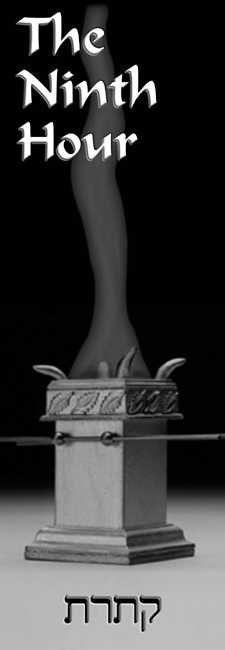The Ninth Hour
Messianic teacher Kevin Williams takes us back to the time of Second Temple and shows the significance of the ninth hour of the day. Was the Messiah using temple language when he declared, “It is Finished”?
 We read in Acts 3:1 “Now Peter and John went up together into the temple at the hour of prayer, being the ninth hour.” Read in passing, we can gather that Kefa and Yochanon (their Hebrew names) were headed up Mount Zion at about 3:00 in the afternoon. This was a time-honored tradition the rabbis tell us goes all the way back to Isaac. “And Isaac went out to meditate in the field at the eventide.”1
We read in Acts 3:1 “Now Peter and John went up together into the temple at the hour of prayer, being the ninth hour.” Read in passing, we can gather that Kefa and Yochanon (their Hebrew names) were headed up Mount Zion at about 3:00 in the afternoon. This was a time-honored tradition the rabbis tell us goes all the way back to Isaac. “And Isaac went out to meditate in the field at the eventide.”1
During the period of the second temple, the ninth hour had become wrapped in ritual and significance. As with many Hebrew observances, one only has to look a little while before encountering word pictures and metaphors that point to the person and purpose of Messiah. Join me as we go on an excursion, away from this temporal existence back to the period when Jesus walked the earth.
Imagine if you will, that you are a Levite. You’re wearing your white linen robe, and you place the priestly turban upon your head. With practiced familiarity, you walk from the Southwest Chamber out into the Court of Priests in Herod the Great’s Temple. The majesty of the temple complex still stuns you, as the golden Holy Place—where the ark of the Lord resides—gleams in the late afternoon sun. All around you are other priests busy about their work—for it is nearly the ninth hour.
Directly before you, the ramp, leading up to the altar, beyond that, a little to your right, is the Holy Place where the Most High dwells.
The shofars, the ram’s horns, blare as the doors to your far right thrust open and the High Priest steps out into the late-day sun. It is time to fulfill God’s holy Torah, “The one lamb thou shalt offer in the morning; and the other lamb thou shalt offer at even.”2 His vestments of gold and jewels shimmer a dazzling array of colors and glory. The golden crown he wears reads, “Holy unto the LORD” and gleams like fire on his head.
A stream of other priests pour in through gates to the south, the north, and the east. Beyond these great bronze doors, you can see throngs of Israelites, milling about expectantly. Across the court, a chorus begins, singing from Psalm 66:15-20:
I will offer unto thee burnt sacrifices of fatlings, with the incense of rams; I will offer bullocks with goats. Selah. Come and hear, all ye that fear God, and I will declare what he hath done for my soul. I cried unto him with my mouth, and he was extolled with my tongue. If I regard iniquity in my heart, the Lord will not hear me: But verily God hath heard me; he hath attended to the voice of my prayer. Blessed be God, which hath not turned away my prayer, nor his mercy from me.
The Cohen Gadol, the High Priest, approaches the great altar. A female lamb is brought forth, innocent and without blemish. It is the last sacrifice of the day—the asham offering—the sin offering that atones for all the sins the Hebrew people were ignorant of committing. Such a God we serve! To cover even our ignorance!
Category: Biblical Studies, Summer 2000


